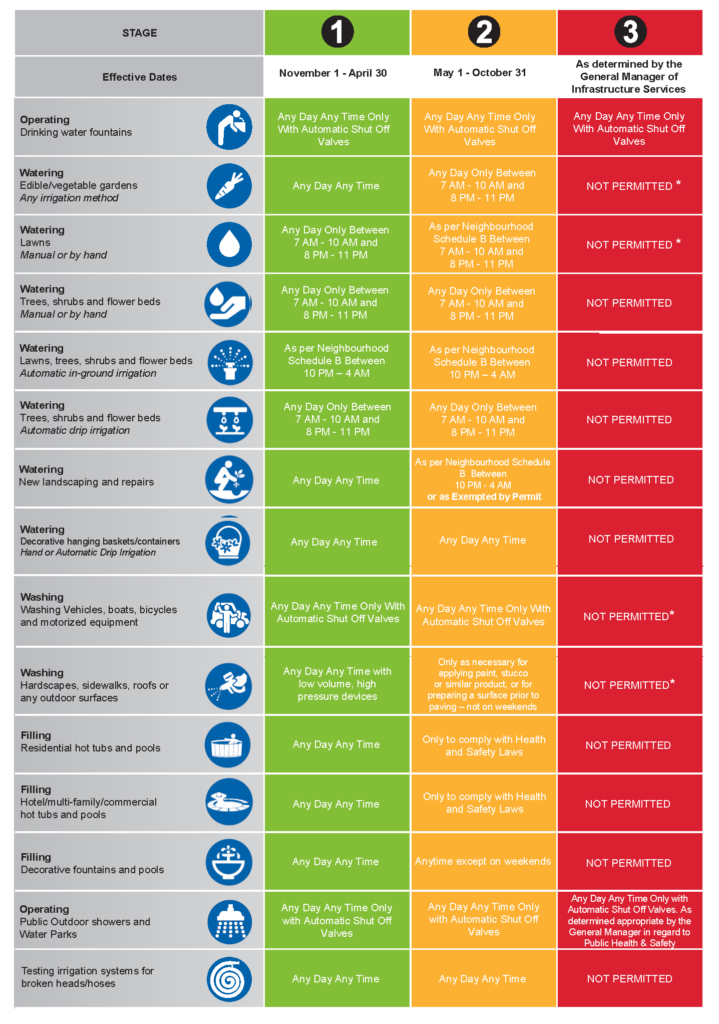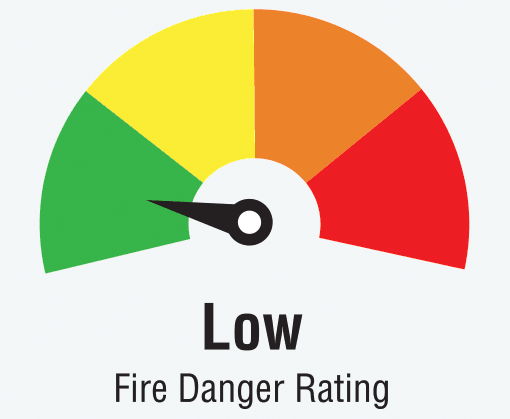There are three stages of water conservation in Whistler. Each stage impacts how water can be used in the community, and is updated weekly during the summer.
Whistler is in Water Conservation Stage 2.
New Water Restrictions in effect for Whistler
To help our community adapt to climate change, new water restrictions are now in place.
With advancing drought conditions, our reservoir levels can reach critically low levels and affect our ability to maintain adequate potable water storage for both a reliable drinking water supply and sufficient waterflow for fire protection.
New watering schedule for automatic, in-ground irrigation systems
- Three days per week based on your address.
- Monday, Wednesday and Friday OR Tuesday, Thursday and Saturday.
- In-ground automatic irrigation systems are limited to six hours of watering (10 p.m. to 4 a.m.) on your designated days.
- See exceptions for vegetable gardens and manual or hand-watering methods.
These measures are designed to balance water conservation with maintaining our lawns and gardens. Automatic summer water conservation measures will advance to severe restrictions only if necessary.
Thank you for your help to keep our community safe and sustainable.
Neighbourhood watering schedule
Properties in the following neighbourhoods are permitted to irrigate lawns, trees, shrubs and flower beds by automatic in-ground irrigation between the hours of 10 p.m. and 4 a.m. as specified below. See exceptions for vegetable gardens, and manual or by hand watering methods.
Mondays, Wednesdays, and Fridays
- Emerald Estates
- Alpine Meadows South
- Wedge Park
- Nesters, White Gold and Spruce Grove
- Whistler Cay Estates and Tapley’s
- Whistler Village South
- Blackcomb Benchlands North
- Alta Vista
- Whistler Creek North and Nordic
- Bayshores and Millar’s Pond
- Nita Lake Estates
- Alta Lake Station
- Rainbow Park
- Twin Lakes
- Cheakamus Crossing
Tuesdays, Thursdays and Saturdays
- Alpine Meadows North
- Rainbow/Baxter Creek
- Nicklaus North
- Nesters Crossing
- Whistler Cay Heights
- Village (North)
- Blackcomb Benchlands South
- Blueberry Hill
- Brio & Sunridge Plateau
- Whistler Creek South
- Whistler Creek and Wayside
- Kadenwood
- Stonebridge
- Spring Creek
- Function Junction
FAQs
If you have a new landscaping installation first please consider the time in which it is installed. You can apply for a permit to water your new landscaping at additional times if you demonstrate you are using efficient watering methods.
- Download and complete the Outdoor Potable Water Use Permit Application.
- Submit the application to the Municipal Hall with the $75 permit fee.
- After review and approval, receive the Outdoor Potable Water Use Permit. The permit must be conspicuously displayed at the location for which it was issued.
The RMOW parks operations will comply with the updated bylaw requirements, with a few exemptions required because of heavy community and visitor use and the risk associated with their replacement costs. These locations are:
- Olympic Plaza great lawn
- Myrtle Phillips School Sports Field
- Whistler High School Sports Field
- Spring Creek School Sports Field
- Rainbow Park and Spruce Grove Park have their own (non-potable) irrigation wells that are subject to different guidelines for use.
While we are fortunate to have multiple fresh water sources, developing additional water sources to deliver potable water is heavily regulated. Whistler’s Community Vision and Official Community Plan requires the RMOW to balance water conservation efforts with increasing supply. Reducing water consumption decreases the amount of water that requires treatment and storage, which reduces energy use and infrastructure costs.
Reducing water consumption decreases the amount of water that requires treatment, which reduces energy use and infrastructure costs. Water use guidelines ensure a reliable supply of potable water to meet Whistler’s daily domestic and commercial needs, protect natural aquatic habitats, and makes sure the community has adequate water for fire protection emergencies.
Potable water use increases in the summer months by more than 50 percent. The community water use target of 425 litres per person per day identified in the RMOW Comprehensive Water Conservation and Supply Plan means that all residents and businesses in Whistler have a shared responsibility to save water for when we need it most.
Water use conservation regulations apply only to the use of potable drinking water. Using rain water, gray water, or any form of recycled water is not restricted. Staff monitor Whistler’s water supply and activate water use restrictions by evaluating the water supply (such as reservoir levels) and forecasts. Residents and visitors are encouraged to conserve water as much as possible to ensure that Whistler is adequately prepared in the event of fire emergencies.
The graphic above provides a summary of the key water usage regulations. It does not contain all information regarding the bylaw. When referencing this bylaw and determining which regulations affect you, refer to the Outdoor Potable Water Usage Bylaw and not the graphic.
Find out how the RMOW saves water.
Contact
Infrastructure Services
604-935-8190
engineers@whistler.ca


